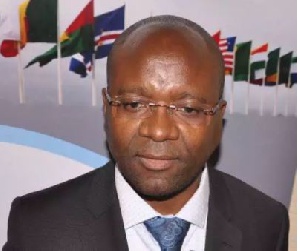 Dr. Dimitri Sanga, Director of the United Nations Economic Commission for Africa Sub Regional Office
Dr. Dimitri Sanga, Director of the United Nations Economic Commission for Africa Sub Regional Office
Dr Dimitri Sanga, Director, United Nations Economic Commission for Africa (UNECA) Sub Regional Office for West Africa (ECA SRO/WA), has said only a potent political will emanating from the headship of the sub-regional grouping could leverage the aspirations of a single-currency regime for the zone in earnest.
He said the economic considerations of unmet convergence criteria, which continue to stampede efforts for a single monetary currency zone for the Economic Community of West African States (ECOWAS), was likely to dislodge the 2020 target of a rollout of a single tariff policy.
“It is imperative that head of states of the bloc reconsider taking a political decision to whip all member countries in line towards leveraging the policy of a single or common currency,” Dr Sanga said in an interview with the Ghana News Agency on the sideline of the launch of the Network of Economic Journalists for West Africa (NEJWA) by UNECA in Dakar recently.
He said two main issues have emerged, which are the comfort being enjoyed by an already medium of exchange for the francophone bloc against the largest economy in the sub-region and in Africa, led by Nigeria, which needed attention going forward.
Dr Sanga said the West African Economic and Monitoring Union (UEMOA), representing the CFA or the francophone bloc, in the majority is up against the rest of different currency states, including Ghana, Liberia and Nigeria.
He said the UEMOA comfort stems from stable currency, pegged to the Euro with the zone expressing uncertainty of joining a new monetary zone, whose future cannot be guaranteed.
“Nigeria’s economy represents more than 75 percent of the GDP of West Africa, meaning macro-economic stability of Nigeria is key in the determination and the rollout of a single currency regime.”
Dr Sanga said ECA’s findings attest that not all convergence criteria were met in the case of the EU before gravitating to gaining a common currency, insisting that this is a political matter, which should be replicated by ECOWAS.
He called on member states to add value to primary products and diversify their economies, moving away from traditional commodities like oil for Nigeria, cocoa for Ghana and Cote D’Ivoire, Niger for Uranium among others.
Dr Sanga said Nigeria could move into agriculture, ICT and the Nollywood entertainment industry as a good product for diversification, which is adding a lot to gross domestic product (GDP).
On the Economic Partnership Agreement (EPAs) he said the principle is to engender industrialization and rapid development across board taking cognizance of processing primary commodities within ECOWAS with estimated population of 374 million, according to the United Nations.
He said its policy to open the European market 100 percent to African countries and 75 percent to products from the European markets under the agreement was apt but indicated that many partner countries would not meet the conditions as they trade in fewer commodities that are mostly in raw state.
The Director said meeting the aspirations of EPA meant that value be added to the commodities being traded with the EU and “it is hoped that countries will trade among themselves raising transaction portfolios with the ideal situation being signing the EPA as a bloc than country-by-country signatures.”
He said “Even when the EU market is opened 150 percent; the maximum benefit will elude Africa as entrepreneurs in Europe are already positioned and would flood the markets in Africa with their finished products.
Dr Sanga said “The maxim, in unity, there is strength, must apply for the signing of the EPA agreements.”